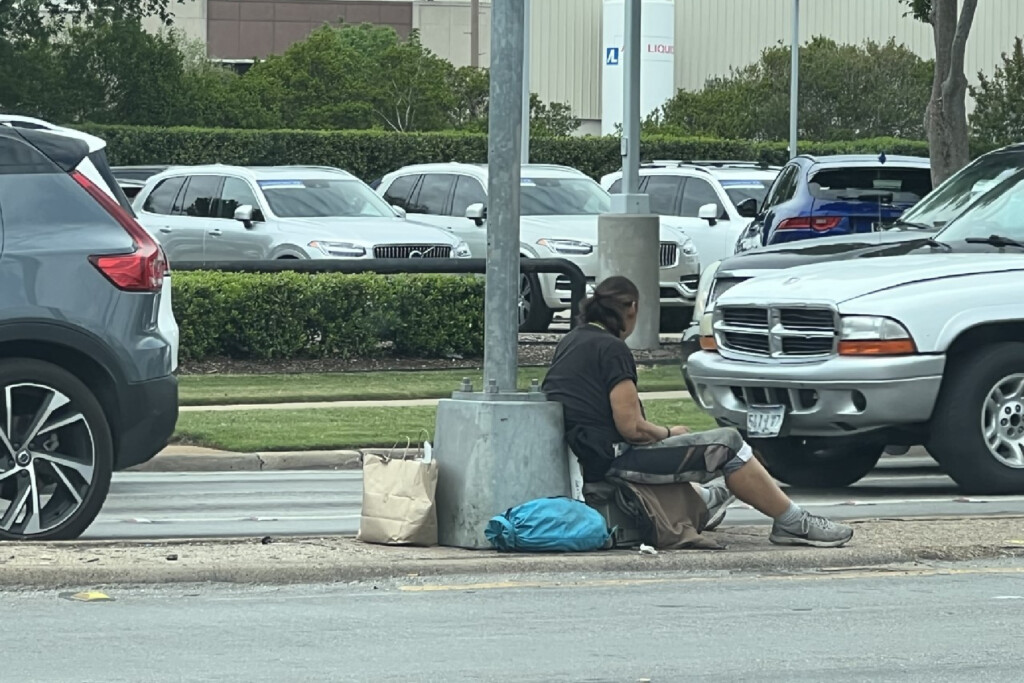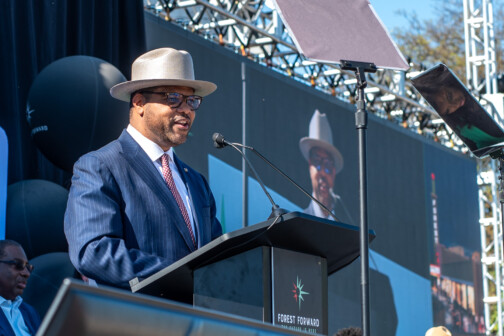In October, the Dallas City Council voted 14-1 to adopt an ordinance that makes standing in the median a $500 fine. Wednesday, two homeless individuals, along with two other plaintiffs, filed a lawsuit against the city, Dallas police Chief Eddie Garcia, and interim Dallas City Marshal David Pughes alleging that the new rule violates the First Amendment.
The city presented the ordinance as a matter of public safety, but the suit alleges that the ordinance seeks to criminalize homelessness. The Texas Civil Rights Project filed the lawsuit along with the SMU First Amendment Law Clinic and Dallas law firm Waters Kraus & Paul on behalf of four people — Alton Waggoner, Teri Heishman, Hannah Lebovits, and Kawana Scott.
Cities can’t ban panhandling outright because of a Supreme Court ruling that declared the act protected speech under the First Amendment. When the plan to ban people standing or walking in medians less than 6 feet wide was first introduced months ago, the measure was offered as a workaround to the SCOTUS ruling.
In October, 14 council members voted in favor of the ban, all citing public safety concerns. The lone no vote was from Councilman Adam Bazaldua, who said he believed the ordinance’s intent was to target the homeless and criminalize poverty.
“Recognizing that such a targeted attack would violate the First Amendment’s prohibition on content discrimination, the City manufactured an unjustified ‘public safety’ rationale for (the ordinance), and attempted to disguise the Ordinance’s real purpose by criminalizing a broad array of speech,” the filing alleges.
“The testimony given by City Council members was very obvious–they wanted an anti-panhandling law,” said Lebovits, an assistant professor of public affairs and planning at the University of Texas at Arlington who also works with the homeless population. “They don’t care about lawsuits, and they deeply underestimate the interest of the public in things like this, and the ability of the public to mobilize.”
The suit also points to three similar ordinances that were struck down by courts in other states, including one in Oklahoma City, where the American Civil Liberties Union of Oklahoma won a suit and an appeal for much the same argument that the TCRP is making.
In October, ACLU Texas attorney Savannah Kumar warned that the city had opened itself up to a legal challenge.
“The ordinance is so substantially similar to one that has already been deemed unconstitutional in federal court,” she said. “Because there is that precedent already in place elsewhere and a federal court had already deemed that similar ordinance unconstitutional—and even the Supreme Court of the United States didn’t hear it—that means that a challenge to this ordinance is very possible.”
The two unhoused people in the suit said that they cannot afford a fine, but also rely on panhandling to survive.
“To get the funds I need for my basic survival, I frequently stand within four feet of the street and use medians of less than six feet to panhandle. Without the ability to do so, it would be impossible to buy food, water, and other basic necessities,” Waggoner said in a statement provided by the TCRP. “I live in constant fear of police harassment and enforcement of the newly passed ordinance.”
The suit says that Waggoner is a 68-year-old veteran who has been homeless for two years, and has previously been fined $450 for soliciting donations. He cannot afford to pay that.
“Even before this new ordinance, I was punished several times by police for being homeless,” Heishman said. “I have no money to pay a citation, but panhandling is currently my only method of survival. I intend to continue panhandling because without it, I have no way of providing for myself.”
The 67-year-old lives in subsidized Veterans Administration housing, but still needs to solicit donations to pay for necessities. The lawsuit says she’s been cited by Dallas police six times for various “behaviors associated with homelessness.”
Scott, who is the chair of the DFW Alliance Against Racist and Political Repression, said it also attaches a punitive measure to using a median for protesting, which is why she signed on to the suit.
“Medians give demonstrators unique access to the public,” she said. “My use of medians for First Amendment activities is informed by the history of the civil rights movement where rallies and protests frequently occurred on medians and areas adjacent to the streets and were critical to achieving civil liberties victories.”
Lebovits agreed. “You can’t criminalize just one form of expression,” she said. “We’re forcing the city’s hand to either admit they only mean panhandling, or to say, ‘Yeah, we really do mean it this broadly,’ which opens them up to legal complaints from other groups.”
You can see the lawsuit here.
Author






